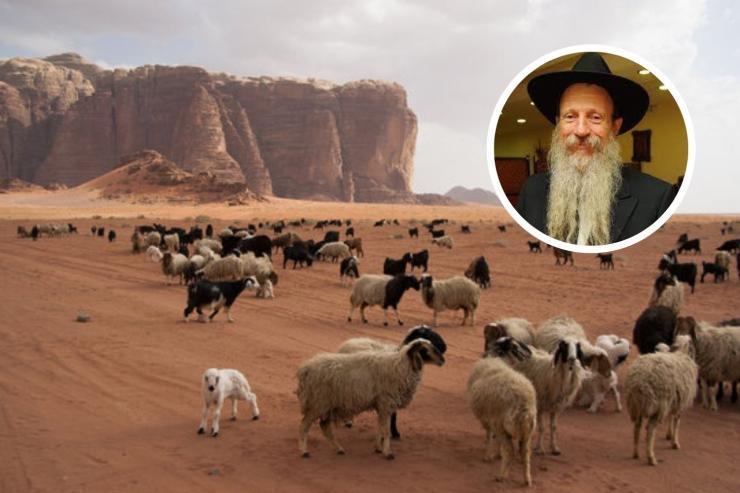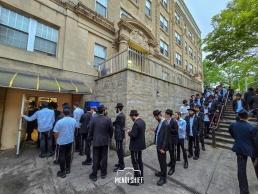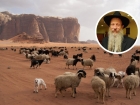The Power of Moshe/Moshiach to Vanquish Evil
From the desk of Rabbi Nissim Lagziel, mashpia in Oholei Torah: There is a statement of the Sages, “If you see a wicked person upon whom the hour is smiling, do not provoke him,” which means that sometimes during difficult times, we see how the world is run by wicked people and they succeed in everything they do. Every decree, every unjust law, all of organized crime, all aggressive behavior, it’s all successful! We need to learn to be quiet and not engage with them. We need to lower our heads, keep a low profile, swallow, and w-a-i-t until the storm passes • Click to Read
BEGIN WITH A GRIN
The new kid walked into the playground and saw the local bully pushing around the little kids. Walking up to the bully, who was much bigger than him, he said, “I don’t think it’s fair for you to start up with kids half your size.” The bully sneered and said, “You must be new around here, so let me tell you how it is. They need to learn that life is not fair, and I’m the one to teach them. Obviously, you need to learn too,” he concluded, as he reached out to push the new kid. Very quickly, the bully found himself face down on the concrete with his right arm twisted up behind his back.
“Hey, no fair, you didn’t warn me you knew karate.”
STANDING DOWN FROM EVIL
In our parsha, Va’eira, we read about the start of the Geula from Egypt which began with Moshe’s message to Pharaoh, on Hashem’s behalf. Moshe insisted that he wasn’t the man for the job; after all, he stammered, “k’vad peh u’kvad lashon anochi,” “and how will Pharaoh listen to me?” he asked. Maybe it would be better to find someone a bit more polished, more fluent, more clear and charismatic. What about Aharon my brother? Moshe tried to get out of the mission.
Hashem responded with, “See, I have made you a lord over Pharaoh,” and if you are concerned about Aharon, remove the concern from your heart – “and Aharon your brother will be your speaker” – we will make him your official spokesman!”
Although we all are familiar with this dialogue, if we think for a moment and examine the opening words, a question arises. What does it mean that Moshe will be an “Elokim” to Pharaoh? Since when is there more than one G-d?
Rashi comes to the rescue and explains, “a judge and a chastiser, to chastise him with plagues and torments.” In other words, the word doesn’t mean a G-d, to make Moshe into an idol, G-d forbid, but that Hashem gave him the power and ability to judge and punish Pharaoh for his evil deeds. Moshe would be, as it were, the rod and stick which G-d would use to strike this cursed despot again and again.
This explanation is fine but still … why the word “Elokim?” Why couldn’t Moshe be called a shofet or moshel? “Elokim” seems a bit much, no?
There is a statement of the Sages, “If you see a wicked person upon whom the hour is smiling, do not provoke him,” which means that sometimes during difficult times, we see how the world is run by wicked people and they succeed in everything they do. Every decree, every unjust law, all of organized crime, all aggressive behavior, it’s all successful! We need to learn to be quiet and not engage with them. We need to lower our heads, keep a low profile, swallow, and w-a-i-t until the storm passes.
In Chassidus (Ohr HaTorah) it explains that during these times even a great tzaddik has difficulty dealing with those wicked people because the ascendancy of the power of evil in the world derives from the control of spiritual kelipos that conceal and cover up the spiritual power of the tzaddik. The control of the kelipos has an effect on the spiritual dimension of things to the point that, as it were, the situation is in G-d’s hands and only He can do something about the situation!
This was precisely the situation in Egypt of that time. Pharaoh was the supreme ruler, a tyrant from whom it was impossible to run so that in the history of his kingdom “no slave was able to flee from Egypt.” Many tried but nobody succeeded. This was a sort of heavenly declaration, “Don’t deal with this madman … only G-d can …” G-d and … Moshe Rabeinu!
STANDING UP TO EVIL
This was why G-d called Moshe “Elokim” and not a moshel, not a tzaddik nor a baba, not a prophet nor a spokesman. “Elokim” – no less and no more! Despite Pharaoh’s physical and spiritual might, despite his supreme spiritual source, and the magical control he had up above and down below, Moshe received the ability from G-d to be “Elokim,” to be the one who would deliver the final blow to global evil. There are things that “only Elokim can do.” Only Elokim and … Moshe whom G-d made into “Elokim.”
Moshe is the memutza ha’mechaber (connecting intermediary) between the Jewish people and G-d. He is the conduit through whom the G-dly energy flow to creation goes. He is the supernatural connector between the material and spiritual and between created beings and the Creator. Therefore, he, and only he, was endowed by G-d with this infinite power to operate as His personal emissary and in His place.
There is an amazing Medrash (Shemos Raba 8, 1) on the verse in Tehillim (24:10), “Who is this King of Glory” – why is G-d called King of Glory? Because He imparts of His Glory to those who fear Him … One does not wear the crown of a flesh and blood king while G-d, in the future, will place His crown on Melech Ha’Moshiach … With a flesh and blood king, nobody is referred to by his name and G-d called Moshe by His name as it says, “See, I have made you a lord (Elokim) over Pharaoh.”
The comparison of Moshiach to Moshe and their connection to G-d teaches us that Moshiach was also given this wondrous ability to operate in the name and power of the “King of Glory,” G-d Himself. Moshiach is also called “Elokim” and he has the G-dly power to judge and chastise the wicked of the earth and to deal with global crime, even if “the hour is smiling on them.” Even if we see difficulties and problems every step of the way, and “the deeds of this world are difficult and evil and the wicked prevail,” (Tanya chapter 6), and we don’t understand from where we will derive the strength to overcome all the obstacles in the path to bringing the true and complete Geula. The answer is the Nasi HaDor who stands in place of, and as the extension of, Moshe Rabeinu, who is called “Elokim;” from the Nasi of the generation who is the Moshiach of the generation, who is graced with the crown of Hashem Himself.
This is an answer to all those who claim we don’t have the strength and ability to change the situation; we need to sit with folded hands and just wait.
If we grasp with all our strength, the instructions, guidance and teachings of the Nasi HaDor, the Rebbe MH”M, “the extension of Moshe” of our generation whose light guides our every step, we too will be like an “Elokim” on a smaller scale, who can break the kelipa of Pharaoh, the tough “back of the neck” (oref being the Hebrew letters of Pharaoh) who stands in the way of the Geula.
TO CONCLUDE WITH A STORY
We will end with a story about how the Chabad leaders judge and rule the kelipos of Pharaoh of their generation, “chastising them with plagues and torments.” The Doctor’s Plot took place in Russia in January 1953. The claim was that Jewish doctors plotted to poison communist Russian leaders. It was a very tense time. All awaited the show trials in which the unfortunate doctors would be sentenced to death for no crime, which would no doubt lead to nationalistic pogroms against the Jews of the Soviet Union, just like in the time of the czar. Stalin, may his name be erased, who was known for his bottomless hatred for the Jews, led the fray. Until Purim.
The Rebbe farbrenged on Purim 5713. As usual, the farbrengen began with a maamar Chassidus which was followed by sichos into the night.
Suddenly the Rebbe said, “This took place in the time of the Russian Revolution, after the fall of the czar. Elections were held and the Rebbe Rashab told his Chassidim to participate. One of the Chassidim, a great masmid and removed from matters of this world, went to vote, as he was told, with awe and trepidation. Upon arriving at the election site, he met other Chassidim who guided him in the voting process. On his way out, he noticed a group of people standing and proclaiming three times, “Hoora, Hoora, Hoora.” The Chassid joined their cry, doing so in Lashon Ha’Kodesh (hoo ra meaning, he is evil).
At this point, the Rebbe raised his hands three times and loudly said, “Hoo ra, hoo ra, hoo ra.”
The Rebbe turned to his right and repeated the story and when he ended it he raised his hands again and repeated what he said before. He turned to the left and then again to those behind him. The astonished Chassidim got the message and from around the room could be heard people exclaiming, “Hoo ra, hoo ra, hoo ra.”
After the uproar in 770 that went on for many long minutes, there was another surprise. The Rebbe, uncharacteristically, prepared to say another maamar. This had never happened before – two maamarim at one farbrengen!
Two days later everyone the world over had heard about the death of Stalin. The Jews of the Soviet Union breathed a sigh of relief as did all Jews worldwide. The very same time that “hoo ra” was exclaimed at the farbrengen, the Rebbe dealt the tormentor a stroke that led to his death!
Good Shabbos!
239
Join ChabadInfo's News Roundup and alerts for the HOTTEST Chabad news and updates!








































Thank you for this interesting & timely lesson post. Schoyach and משיח כאו!!